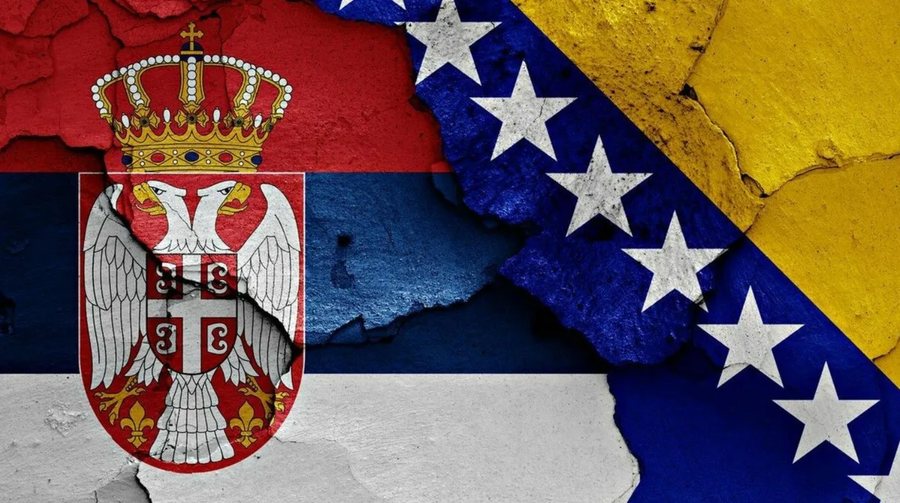
Serbia will have to position itself towards the Franco-German proposal for a way out of the institutional crisis in Bosnia and Herzegovina, says Eric Gordy, professor of political sociology at the University of London, to Radio Free Europe.
He says that Serbian President Aleksandar Vučić, after his recent meeting with Russian President Vladimir Putin in Moscow, does not have much room for maneuver vis-à-vis the European Union on this issue, reports A2.
"I think he's counting on Europe's support - both economically and against the anti-regime protests that have been taking place in Serbia for six months now," Gordy says.
What does "non-paper" mean?
In the unofficial document, known as a “non-paper,” which is said to have been drafted by France and Germany, EU countries are invited to suspend financial projects that benefit Republika Srpska, as well as to consider imposing targeted sanctions against officials of this Bosnian entity who “undermine the sovereignty and constitutional order of Bosnia and Herzegovina.”
The document also proposes the cessation of contacts with the president and prime minister of Republika Srpska, Milorad Dodik and Radovan Viskovic, as well as with the speaker of the Assembly of this entity, Nenad Stevandic.
Commenting on these proposed mechanisms, Gordy says that some of them have already been implemented by several EU member states.
"The harshest sanctions have already been imposed by Germany, Austria and Lithuania," he recalls.
According to Gordy, the behavior of the President of Republika Srpska, Dodik, has necessarily required the undertaking of such an initiative.
"Something had to be done, because Dodik was practically asking for it. He violated the travel ban when he went to Serbia, Russia and Israel. I think he deliberately defied them, thinking he was powerful enough not to obey the bans. Europe needs to react to this."
What are the EU's obligations towards Bosnia?
Radio Free Europe: Does this document, although not legally binding, show that the EU is trying to strengthen its position in Bosnia and the Western Balkans?
Eric Gordy: The situation in Bosnia is unstable, and this is the right moment for such action. Moreover, although Russia has a role in the region, it is weaker now, and it cannot focus on the Balkans. So it is time for Europe to show its influence.
It is important to propose that the EU reaffirm its role as guarantor of peace in Bosnia, as foreseen in the Dayton Agreement. It should also be remembered that Bosnia is a candidate country for EU membership, which implies certain responsibilities of the EU towards it.
Another important aspect is the proposal for a new constitutional solution for Bosnia. If something serious is undertaken in this direction, it would be a big step, because in reality Bosnia – despite the existence of Annex V of the Dayton Agreement – does not have a clear constitution. Therefore, manipulations are possible. If such a reform is seriously worked on, it would be a great progress for Bosnia.
What is expected from Aleksandar Vučić?
Radio Free Europe: How can Serbia position itself in this situation?
Eric Gordy: Serbia is now, especially after Vučić's visit to Russia, under pressure to show how seriously it takes its relationship with the EU and its membership bid. This will be yet another form of pressure, to which Vučić, to be honest, can hardly respond clearly. I think he is counting on European support for the economy and to withstand the anti-regime protests in Serbia.
Radio Free Europe: Do you see a deterioration in relations between Belgrade and Sarajevo as possible?
Eric Gordy: It could happen. I follow the discourse in the pro-regime media in Serbia and there are often calls for a clash. But neither Vučić, nor any other Serbian official, can forget that Serbia is a signatory to the Dayton Agreement and has an obligation to recognize and respect Bosnia’s sovereignty. Official Belgrade has done so – to a greater or lesser extent over time – but it cannot abandon that obligation.
Will the sanctions have any effect?
Radio Free Europe/Radio Liberty: How do you assess the measures that include the suspension of financial aid to Republika Srpska, targeted sanctions against officials and legal entities, the severance of contacts with leaders in Banja Luka, and the slowing down of Bosnia's European path? Can these measures yield results?
Eric Gordy: As dramatic as they sound, most of these measures are already in place. The harshest sanctions have been imposed by Germany, Austria and Lithuania. There is not much new. Even the isolation is already happening. The only EU countries that do not practice this are Slovakia, Hungary and partly Croatia.
How might Milorad Dodik react?
Radio Free Europe: Could these measures help Dodik get even closer to Putin?
Eric Gordy: I don't think he can do more than what he has done so far. After all, Putin is busy with the war in Ukraine and he no longer has as much influence in the Balkans as he did four or five years ago.
It has also become clear that Dodik was overly ambitious in his initial actions. He thought he would receive support from Serbia, Russia, and the United States, especially after Donald Trump's arrival in the White House.
But he has not received this support – neither from the public in Republika Srpska nor from the opposition there. His position is weakening, no matter how harsh his rhetoric.
Radio Free Europe: Can the "non-paper" strengthen its political position?
Eric Gordy: I think more and more people in Republika Srpska are realizing that Dodik is costing them too much./ REL (A2 Televizion)











